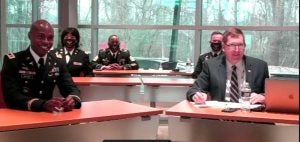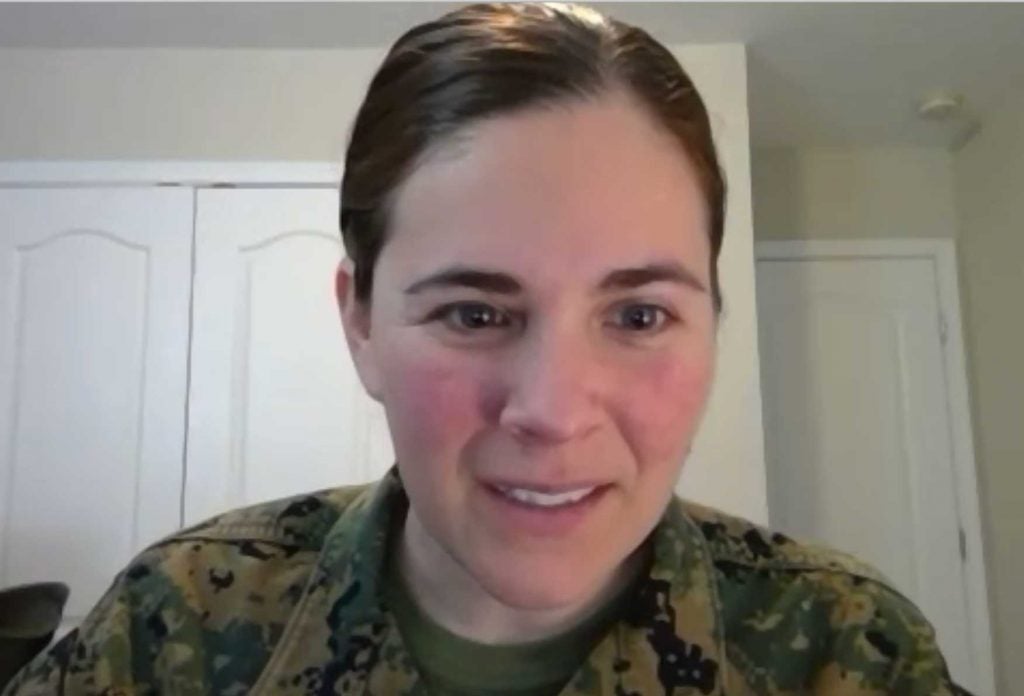Panel talks parallels in rural and military dentistry
During the virtual Rural Health Symposium on Feb. 26, dentists serving in the U.S. Armed Forces outlined how their experiences and resources could translate to better access to dental care for rural North Carolinians.
The session “Dentistry in Remote Locations: Lessons from the Armed Forces” featured dentists from the Army, Navy and Air Force and was facilitated by Dr. T. Rob Tempel, associate dean for extramural clinical practices for the East Carolina University School of Dental Medicine.

Army Maj. Gamal Baker, left, comprehensive dentist at Fort Bragg, presented on Feb. 26 during a Rural Health Symposium session facilitated by Dr. T. Rob Tempel, right, associate dean for extramural clinical practices for the ECU School of Dental Medicine.
The popular session drew questions and comments from the audience, which was made up of dentists and other providers who attended the conference to learn about ways to partner and innovate for better health care for patients in rural parts of the state.
The session’s speakers included Army Maj. Gamal Baker, a comprehensive dentist at Fort Bragg; Navy Lt. Cmdr. Megan R. Carter and Air Force Maj. John R. Mallya, both in their services’ Dental Corps as well.
Baker highlighted the Army’s efforts to transform dental care through technology and access in remote locations and a variety of situations—and the importance of having fast and mobile resources that mimic dental office set-ups as closely as possible.
“We’re trying our absolute best to bring that fixed facility standard to the field,” he said.
Baker’s presentation also showcased some of the modern dental equipment that easily translates to use in the Army, including hand-held x-ray equipment and other portable tools that improve capabilities of treating patients in remote or temporary environments.
Carter described a routine dental office on a Navy ship, stressing that most dental areas on ships are not equipped to treat civilians during humanitarian missions or disasters but can set up in alternate sites to meet needs in those situations. The offices instead focus on routine and as-needed care for sailors.
Navy dentists, she added, also focus on providing care to units “while they’re home and get them ready to deploy.”
Mallya, a comprehensive dentist at Seymour Johnson Air Force Base, said the theme in any situation is “readiness.”
“The key theme,” he said, “is that readiness is always the central focus with our mission.”
The innovative readiness training Mallya described could help dentists in rural areas adapt to the resources they have available, assess situations and reach out to other professionals for additional input.
“We care for the population in need while at the same time use our prepared assets,” he said.

Navy Lt. Cmdr. Megan R. Carter talked about serving as a dentist in the Navy during a dentistry panel on Feb. 26 as part of Eastern AHEC’s Rural Health Symposium.
All three speakers emphasized the opportunities that exist in the advancement of teledentistry— the use of information technology and telecommunications for dental care, consultation and education.
“Teledentistry is still a relatively new concept for the Air Force,” Mallya said, “but we’re excited to see what capabilities are in the future.”
All three also voiced optimism in overcoming challenges like connectivity issues or time zone differences that can hinder teledentistry consultations in real time. When the processes come together, however, the results can improve patient outcomes and make dentists feel less isolated in the field by making experts accessible through technology.
“Knowing you can provide that level of care, even when you’re out in the ocean, is very comforting,” Carter said.
Tempel said rural dentists can feel isolated as well, a problem that the ECU dental school and its community service learning centers across the state are working to address—in part through collaborations with community and state partners.
“Being a part of ECU, teledentistry is a very strong network,” he said. “Through great collaborations, we’re making great progress in the state with teledentistry.”
Tempel also said the Armed Forces dentists’ presentations opened doors to dialogue about future partnerships and possibilities.
“The teamwork you’ve talked about really needs to exist in civilian dentistry,” he said. “Through teledentistry, that can happen. We all have the common goal of improving health in North Carolina.”
Tempel added that the presenters serve as examples to others in the field.
“It’s clear that you’re excellent clinicians,” he said, “but you’re also leaders.”
The annual Rural Health Symposium is sponsored by Eastern AHEC and presented via live webinar on Feb. 25 and 26. The conference offers interprofessional sessions, panels and presentations that focus on collaborative efforts to provide better access to health care for rural North Carolinians.
The event was also sponsored by the Office of Continuing Medical Education of the Brody School of Medicine at East Carolina University, ECU Medical & Health Sciences Foundation, ECU Department of Public Health and the Triangle Healthcare Executives’ Forum of North Carolina.